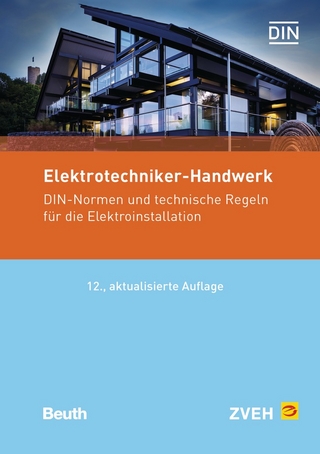
Robust Battery Management Systems: Theory, Algorithms, and Software
Artech House Publishers (Verlag)
978-1-63081-952-1 (ISBN)
You will get the necessary background to understand, implement and improve battery fuel gauges in electric vehicles, and general state of health of the battery; use proven models and algorithms to estimate the thermal properties of a battery; and know the basics of smart battery charger design. You will also be equipped to accurately estimate battery features of vehicles, such as state of charge, expected charging time, and state of health, to make customized charging waveforms for each vehicle.
The book teaches you how to create simulation environments to test and validate algorithms against model uncertainty and measurement noise. In addition, the importance of benchmarking battery management algorithms is covered, and several bench marking metrics are presented. Included MATLAB codes give you an easy way to test the algorithms using realistic data and to develop and test alternative solutions. This is a useful and timely guide for battery engineers at all levels, as well as research scientists and advanced students working in this robust and rapidly advancing area.
Chapter 1 Introduction
1.1 Introduction
1.2 Who is this Book For?
1.3 Use Cases
1.4 What Is Novel in This Book?
1.5 Organization of this Book
1.6 MATLAB Codes
1.7 Bibliographical Notes
Chapter 2 Review of Required Mathematics
2.1 Introduction
2.2 Least Squares Estimator
2.3 Kalman Filter
2.4 Extended Kalman Filter
2.5 Conclusions
2.6 Bibliographical Notes
2.7 Problems
Chapter 3 Battery Modelling
3.1 Introduction
3.2 Elements of Electrical Equivalent Circuit Models
3.2.1 DC Equivalent Circuit Model
3.2.2 AC Equivalent Circuit Model
3.3 Reduced Order Models
3.3.1 Ideal Battery Model
3.3.2 Open Circuit Voltage Model
3.3.3 Relaxation Model
3.3.4 Hysteresis Model
3.3.5 Enhanced Self Correcting Model
3.3.6 R-int Model
3.3.7 Other Reduced Order Models
3.4 Battery Power
3.5 Battery Capacity
3.5.1 Total Capacity
3.5.2 Discharge Capacity
3.5.3 Rated Capacity
3.5.4 Custom Defined Capacity
3.6 State of Health
3.7 Battery Packs
3.8 Battery Simulator
3.9 Summary
3.10 Bibliographical Notes
Chapter 4 Open Circuit Voltage Characterization
4.1 Introduction
4.2 Empirical OCV-SOC Models
4.2.1 Linear regression models
4.2.2 Nonlinear regression models
4.2.3 Hybrid or piecewise linear models
4.2.4 Tabular model
4.3 OCV-SOC Model Parameter Estimation
4.3.1 Linear least squares
4.3.2 Nonlinear least squares
4.3.3 Hybrid estimation
4.3.4 Tabular model estimation
4.4 Model Selection Metrics
4.4.1 OCV prediction error
4.4.2 Model evaluation metrics
4.4.3 Computational complexity
4.4.4 Numerical stability
4.4.5 System requirement
4.5 Selection of OCV-SOC Model
4.6 Summary
4.7 Bibliographical Notes
Chapter 5 Frequency Domain Approaches to Battery ECM Identification
5.1 Introduction
5.2 Frequency Response of a Battery
5.3 Computing Frequency Response Using DFT
5.4 ECM Parameter Estimation Problem
5.5 Approximate Estimation of ECM Parameters
5.6 Causes of Parameter Estimation Error
5.6.1 Effect of Approximation
5.6.2 Effect of Measurement Noise
5.7 Improved Approach for Parameter Estimation
5.7.1 Estimation of Warburg Coefficient
5.7.2 Estimation of CT Components
5.7.3 Estimation of SEI Components
5.7.4 Estimation of Resistance and Inductance
5.7.5 Feature Point Extraction
5.8 Demonstration
5.8.1 Demonstration Using Simulated Data
5.8.2 Demonstration Using Real Data
5.9 Summary
5.10 Bibliographical Notes
Chapter 6 Time Domain Approaches to Battery ECM Identification
6.1 Introduction
6.2 Signal Model of a Battery
6.3 ECM Identification of Different Model Orders
6.4 Parameter Estimation Method
6.5 Performance Analysis
6.6 Simulation Analysis
6.6.1 Perfect ECM Assumption
6.6.2 Realistic ECM Assumption
6.6.3 Real Data
6.7 Summary
6.8 Bibliographical Notes
Chapter 7 Battery Capacity Estimation
7.1 Introduction
7.2 Basics of Battery Capacity Estimation
7.2.1 Offline Estimation of Battery Capacity
7.2.2 Real-time Capacity Estimation
7.3 Capacity Estimation in the Presence of Noise
7.3.1 LS Estimate
7.3.2 TLS Estimate
7.4 Recursive Estimates
7.4.1 Recursive LS
7.4.2 Recursive TLS
7.4.3 Kalman Filter Based Fusion
7.5 Experimental Results
7.5.1 OCV-SOC characterization test
7.5.2 Dynamic discharge-charge profile
7.5.3 Real-time capacity estimation
7.6 Conclusions
7.7 Bibliographical Notes
Chapter 8 Battery Fuel Gauging
8.1 Introduction
8.1.1 State of Charge
8.1.2 Time to Shut Down
8.1.3 State of Health
8.1.4 Remaining Useful Life
8.2 SOC Estimation: Coulomb Counting Approach
8.3 SOC Estimation: OCV Based Approach
8.4 SOC Estimation: Fusion Approach
8.4.1 Measurement Model
8.4.2 Scaling
8.4.3 Extended Kalman filter for SOC tracking
8.5 Filter Consistency Testing approaches
8.5.1 Normalized Innovation Squared (NIS)
8.5.2 Zero-mean Test of Innovations
8.6 Results
8.7 Conclusions
8.8 Bibliographical Notes
Chapter 9 Battery Thermal Management
9.1 Introduction
9.2 Thermal Management Mediums
9.2.1 Air
9.2.2 Liquid
9.2.3 Phase Change Material
9.3 Battery Thermal Modelling
9.4 Simulation Results
9.5 Conclusions
9.6 Bibliographical Notes
Chapter 10 Optimal Charging Algorithms
10.1 Introduction
10.2 Charging Strategies
10.2.1 Constant Current Charging
10.2.2 Constant Voltage Charging
10.2.3 Constant Current-Constant Voltage Charging
10.2.4 Multi-stage Constant Current Charging
10.2.5 Pulse Charging
10.2.6 Trickle Charging
10.2.7 Float Charging
10.3 Optimized Charging Strategies
10.4 Numerical Results
10.5 Summary
10.6 Bibliographical Notes
Chapter 11 Evaluation and Benchmarking of Battery Management Systems
11.1 Introduction
11.2 CC Metric 11.3 OCV-SOC Metric
11.4 TTV Metric
11.5 Demonstration of BFG Evaluation
11.6 Summary
11.7 Bibliographical Notes
Appendix A Closed form Derivation of TLS Estimate
Appendix B Formal Derivation of Capacity
Appendix C Discretization of State-Space Model
| Erscheinungsdatum | 11.07.2023 |
|---|---|
| Verlagsort | Norwood |
| Sprache | englisch |
| Maße | 152 x 229 mm |
| Themenwelt | Technik ► Elektrotechnik / Energietechnik |
| ISBN-10 | 1-63081-952-2 / 1630819522 |
| ISBN-13 | 978-1-63081-952-1 / 9781630819521 |
| Zustand | Neuware |
| Haben Sie eine Frage zum Produkt? |
aus dem Bereich


